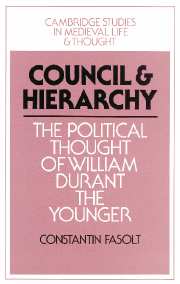Book contents
- Frontmatter
- Contents
- Acknowledgments
- List of abbreviations
- List of manuscript sigla
- INTRODUCTION
- PART I THE FORMATION OF INTEREST
- PART II THE ASSERTION OF JUSTICE
- PART III THE INCIDENCE OF POWER
- 8 THE SUBLIMATION OF REFORM
- 9 THE ADVENT OF THE PRINCE
- CONCLUSION
- Appendix: A note on texts and citations
- Bibliography
- Concordance
- Index
- Cambridge studies in medieval life and thought Fourth series
9 - THE ADVENT OF THE PRINCE
Published online by Cambridge University Press: 06 July 2010
- Frontmatter
- Contents
- Acknowledgments
- List of abbreviations
- List of manuscript sigla
- INTRODUCTION
- PART I THE FORMATION OF INTEREST
- PART II THE ASSERTION OF JUSTICE
- PART III THE INCIDENCE OF POWER
- 8 THE SUBLIMATION OF REFORM
- 9 THE ADVENT OF THE PRINCE
- CONCLUSION
- Appendix: A note on texts and citations
- Bibliography
- Concordance
- Index
- Cambridge studies in medieval life and thought Fourth series
Summary
It is not unheard of that bishops and even more exalted dignitaries are sometimes reported to the Apostolic See and their deeds subjected to its judgment.
John XXIIWhen the council of Vienne was over William Durant the Younger found himself in a precarious position. He had launched an attack on papal government whose viability depended upon a fortuitous combination of circumstances beyond his control that had quickly passed away. Whereas Pope Clement V had regained a position from which the plenitude of power could be exercised with confidence, his own project of restoring hierarchy through councils had miscarried. The justice on which, as he believed, it had been founded was now a justice without weight.
In this way the seeds of William Durant the Younger's decline were sown. But that did not become apparent until some years thereafter. The disagreement with Clement may have been deep in principle – and we can only guess how deep – but it was manifested only briefly. Soon after the council was over Clement granted Durant a number of favours. While this was only a common courtesy which was also bestowed on other participants in the council, it does indicate that their relationship had not been disturbed in any lasting way. These were also the years when his local opponents were finally and decisively subjected to his control, while his association with the monarchy was blossoming.
- Type
- Chapter
- Information
- Council and HierarchyThe Political Thought of William Durant the Younger, pp. 305 - 314Publisher: Cambridge University PressPrint publication year: 1991

